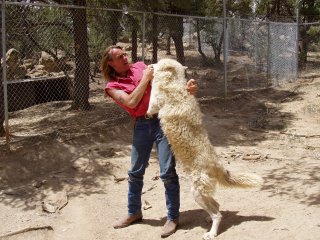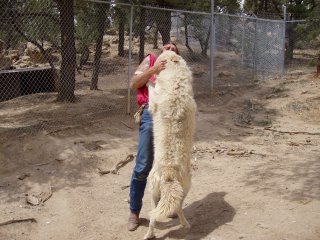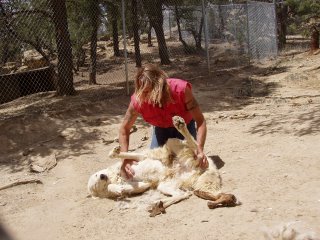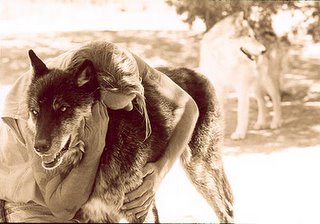Daddy I want a Wallaroo!
Walaroo? Instantly my mind begins to conjure images of some tusked fat furry animal bounding along the beach and surf. Then my thought suddenly shifts to the more likely a wallaby and a kangaroo. Well if I can’t have a Walaroo then can I have a Kinkajous? A kinka-what?
Today with the internet marketplace it is extremely simple to find almost any animal you might imagine and purchase it on line. Having access to such a diverse and dangerous assortment of animals that are so unsuited to life as pets has created a huge upsurge in the exotic animal trade. It is estimated that the exotic and wild animal pet business worldwide is over $15 billion dollars a year.
Today online if you have a spare $50,000.00 you can get a baby Chimpanzee. How about an Albino Sugar Glider for $6000.00? A six week old African lion will go for a measly $1,200.00 bucks. The older they get the cheaper they become. Babies are so darn cute!
Are they glamorized on television and other media sources? Paris Hilton. has one and Michael Jackson. has some why shouldn’t I?
It is estimated that captive tigers living in the United States is around 5,000 to 7,000.Only about 10% of the tigers are kept in professionally run zoos and sanctuaries. The rest of these unfortunates live their lives out in roadside attractions, circuses, traveling shows, big cat rescues, and backyards, basements and garages where people attempt to keep them as pets.
"In a retail store, a rural property, a basement breeding room, or a suburban split level bedroom, you can meet the monkey of your dreams, dressed in a doll's clothes and wearing a diaper. Or you can bottle feed a cougar cub, so preciously spotted, and then see his mother and dad in the chain-link 8x8 pen in the back" . Richard Farinato
With the sudden surge of exotic sales what will ultimately have to happen?
Let’s just quickly follow the most likely outcome of the exotic pet. In many cases the animal is bred by a rather inexperienced hobbyist in poor financial condition living in virtual squander. The breeder raises the animal for the shortest length of time possible then sells the animal to pet shop or dealer. Where the animal is kept for who knows how long in very small cage so not to take up any more room than necessary. Then the unfortunate critter is sold to an even less experienced person. Who then takes it home and enjoys his or her fun little baby.
Then it grows up and is not as fun or cute and cuddly. The novelty has worn out, so it gets sequestered to an out of site out of mind place until the hopeful helpful good natured friend or relative “rescues" it from it’s emanate demise. Soon the hopeful rescuer discovers the difficulty the last owner experienced and must look for help themselves.
But is there a Walaroo rescue? Why yes there is! As well as elephant rescue, tiger, lion and liger rescues. I believe humans should get some better sense about them. There should be no need in the USA for us to have so many animal rescues and sanctuaries. We should be smarter then that, don’t you think? Or am I just ranting?
There are probably many reasons not to buy, sell and own wild animals. What about diease?
The Monkeypox outbreak originated with a shipment of imported African rodents, and then spread to American rodents (prairie dogs), all in the pet trade. Shouldn’t we all become a little better informed? Shouldn’t we choose our pets more wisely and appropriately?
Wild animal are intriguing, exciting and adventuring. There is a definite allure to the idea of owning a piece of the wild.
How about this? Just buy a big chunk of land and enjoy the wild life that lives there!
.JPG)

.JPG) But for now I enjoy every minute of her growth and discovery and I hope she will cherish the unique moments with nature that she experiences so often and knows that indeed she has a life like so few other kids around the world.
But for now I enjoy every minute of her growth and discovery and I hope she will cherish the unique moments with nature that she experiences so often and knows that indeed she has a life like so few other kids around the world..JPG) Here is my "Little
Here is my "Little Red Riding Hood"......
Red Riding Hood".......JPG)

.JPG) But for now I enjoy every minute of her growth and discovery and I hope she will cherish the unique moments with nature that she experiences so often and knows that indeed she has a life like so few other kids around the world.
But for now I enjoy every minute of her growth and discovery and I hope she will cherish the unique moments with nature that she experiences so often and knows that indeed she has a life like so few other kids around the world..JPG) Here is my "Little
Here is my "Little Red Riding Hood"......
Red Riding Hood".......JPG)








.JPG)







